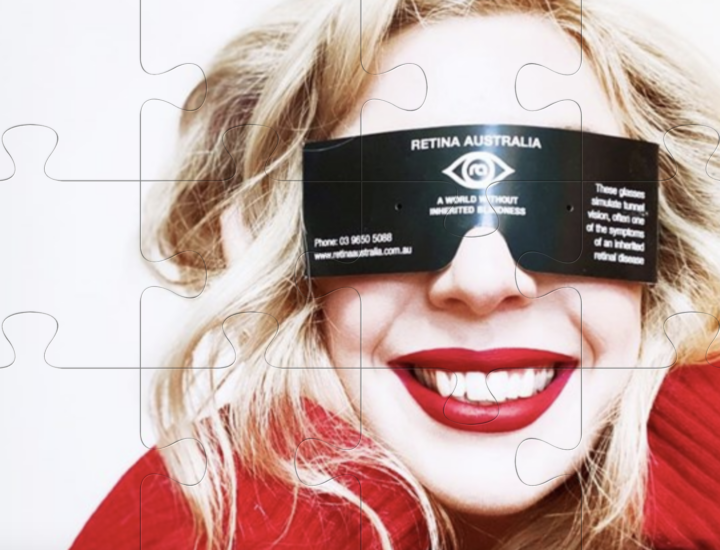Help raise awareness
Help raise funds to find new treatments
Join our campaign!
Retinitis pigmentosa, also known as RP, is an inherited retinal disease (IRD) that causes loss of vision and blindness. The condition is slowly degenerative, but the rate of progression and degree of visual loss can vary from person to person, and even among affected members of the same family. It is the most common form of IRD 1 and in Australia, it is estimated that one in 3,000 people has RP, which equates to approximately 8,900 individuals. 2
Join us this February to raise awareness for RP and to also raise funds to invest in research discoveries of new treatments.
How you can participate in Retinitis Pigmentosa Awareness month
There are three ways to participate in the Retinitis Pigmentosa Awareness Month this February with Retina Australia:
1. Register for a Do It in The Dark (DITD) event
What is Do It in the Dark?
Do it in the Dark (DITD) is a unique Retina Australia event which aims to create awareness about inherited retinal diseases, and raise funds to support life-changing medical research and provide information and support.
Registrants can host an awareness and fundraising event and participate either alone or by gathering family, friends, neighbours or co-workers, to complete a fun activity while wearing our custom-made glasses (see image below). These glasses simulate tunnel vision which can be a common symptom of people living with an inherited retinal disease, particularly for those living with retinitis pigmentosa.
What you need to do
- All you need to do is register here for a DITD event and we will be in contact to send out the glasses you need for all your participants. Please note that the earlier you register the sooner we can send out the glasses in time for your event.
- The next step is to set up a Just Giving fundraising page here. This is free to do and makes it easy for people to donate under your name and event, with tax deductible receipts provided automatically for donations of $2 and over.
- Start raising awareness and fundraising by promote your event!
Click here for more information about DITD including some event ideas. If you’re stuck for inspiration or time to organise an event in February, you can simply take on the DITD puzzle challenge!
DITD puzzle challenge
We have created an online digital puzzle (image on the right) which you can complete as your DITD event.
Participants can donate to take part in the challenge, which is both safe and fun to do, even for children as a school fundraiser. For a workplace event, you could ask your employer if they might match employee funds raised. What a terrific way to engage staff in activity for social impact!
All you need to do is have your DITD participants pop on a pair of Retina Australia glasses and complete the puzzle as fast as they can. There’s a timer so you can measure the quickest puzzle solver. Click here to find out more about the challenge and to view the DITD puzzle.
2. Raise awareness
Ways you can raise awareness of Retinitis Pigmentosa this February include:
- Talk to your family, friends and colleagues about retinitis pigmentosa (RP).
- You can find information about RP on our website here.
- You can also find other useful information our website such as emerging treatments, genetic testing, clinical trials and guides for the newly diagnosed, parents of children diagnosed and for friends of the people diagnosed with an inherited retinal disease.
- Post about RP on your social media platforms
- We have created some social media assets which you are free to download and use to spread the word. You will need to link the images and your captions to our Information page on retinitis pigmentosa here for them to access more information.
- Don’t forget to tag @retinaaustralia and use the hashtags #RetinitisPigmenosaAwarenessMonth, #RetinitisPigmentosa #RetinitisPigmentosaAwareness #RetinaAustralia
3. Donate
You can also contribute to Retinitis Pigmentosa Awareness Month by simply donating.
Your support will help fund future research into finding new treatments and also supporting people with inherited retinal disease.


